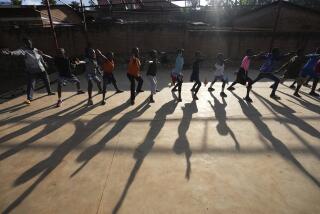Peace Between the Tutsis and Hutus an Elusive Goal in Divided Burundi
- Share via
BUJUMBURA, Burundi — The small, bullet-riddled truck stands in the dark on a desolate road next to Lake Tanganyika. Its hazard lights are still flashing. A body slumps over the dashboard.
Soldiers in an armored vehicle play a spotlight across the adjacent cotton and banana fields looking for the rebels who ambushed the truck.
The soldiers are from Burundi’s army, dominated by members of the nation’s Tutsi community. The rebels are Hutus. The scene is one of hundreds of violent incidents in this central African nation, where tension runs high between the two groups and foreign diplomats and aid workers are struggling to keep things calm.
Normally, the Tutsi soldiers do not leave their barracks after dark unless they are going on a mission against the rebels or responding to an attack. They are afraid of the Hutus, who outnumber Tutsis in Burundi almost 6 to 1.
Although Hutus account for 85% of Burundi’s 5.6-million people, Tutsis have kept control of the army since 1965. Hutu troops were purged after they staged an unsuccessful coup against a Tutsi-led government that had ruled since independence from Belgium in 1962.
Working in a sea of potential enemies, the Tutsi soldiers say they do not know whom to trust, especially at night.
“The soldiers in the interior are very scared. They shoot too much and have lost their military ethic,” said Maj. Pontien Gaciyubwenge, who commands an army battalion in Bujumbura, the capital. “We must restore discipline and the military ethic if we are going to restore peace to this country.”
Gaciyubwenge is an elite officer in the Burundian army. After promotion to captain in 1987, he was sent for military training in the United States. He completed the special forces officers course at Fort Benning, Ga., paratrooper training at Fort Bragg, N.C., and the military intelligence officers course at Fort Huachuca, Ariz.
He commands 800 paratroopers along the southern edge of the capital where Hutu rebels have recently staged attacks.
Gaciyubwenge is a strong supporter of Maj. Pierre Buyoya, the military ruler who seized power July 25 with a pledge to restore discipline in the often barbarous army. Commanders like Gaciyubwenge are crucial to making the pledge come true, but they are also rare.
“I tell my soldiers the objective is peace. I teach them that when they meet the local population, don’t be hungry for a fight,” Gaciyubwenge said. “I tell them to be modest because we need the people to trust us to have peace.”
But Gaciyubwenge is not typical. The army has a reputation for brutal and senseless violence, and Gaciyubwenge said only seven of the 27 battalion commanders in the 12,500-man army have received military training outside Burundi.
Most officers have been trained by other Burundians or French military advisors who were withdrawn earlier this year.
More than 150,000 people have died in ethnic violence in Burundi since 1993, most of them civilians. Few of the victims died in actual combat, and human rights groups say the army is responsible for most of the killing.
Gaciyubwenge said Hutus no longer run away when soldiers of his battalion approach. He points proudly to the new roads his men have built with the cooperation of Hutu villagers, to the return of Hutus to neighborhoods in the southern part of Bujumbura from which they were driven by force, and to the overall calm.
But Lt. Deo Hatungimana, a platoon leader under Gaciyubwenge’s command, said things are different out in the hills that roll away from the lake and Bujumbura.
He said that just two miles from an abandoned church his men have converted into a barracks, there are rebels and Hutu villagers who oppose the army.
Most Hutu villagers are caught between the rebels, who roam the countryside with impunity, and the army, which demands cooperation but does not have enough men to protect villages from reprisals.
Gaciyubwenge believes the answer is to win the confidence of the villagers, so he wages a hearts and minds campaign not too different from the one U.S. military forces tried to carry out in South Vietnam.
More to Read
Sign up for Essential California
The most important California stories and recommendations in your inbox every morning.
You may occasionally receive promotional content from the Los Angeles Times.













